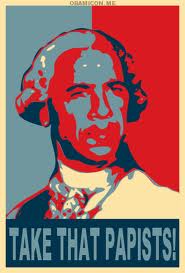 Gil Bailie of The Cornerstone Forum is touting an article by George Wesolek in Catholic San Francisco, June 6, 2012, entitled “On Religious Liberty and a Confused Media.” The article begins,
Gil Bailie of The Cornerstone Forum is touting an article by George Wesolek in Catholic San Francisco, June 6, 2012, entitled “On Religious Liberty and a Confused Media.” The article begins,
Is it that the media doesn’t understand the issue of religious liberty and the Catholic Church, or do they refuse to report it for reasons of their own?
When the U.S. Health and Human Services mandate was promulgated by HHS Secretary Kathleen Sibelius early this year, it forced Catholic institutions – in social services, health care and education – to offer all employees, free of charge, contraception, sterilization and abortion-inducing drugs. These services are considered immoral by the church and so, naturally, the U.S. bishops objected and asked for a conscience exemption. Conscience objections have been given over the years in the interplay between state and church over a variety of issues and were considered commonplace.
But this case was different. Hidden away in the multitude of regulations accompanying the mandate was a new definition of what was to be considered “religious activity.” This new definition limited “religious activity” to houses of worship and its congregants. An exemption, therefore, would be given only to a religious entity that serves and teaches its own faithful. Serving others not of our faith, as do our social services, health care and education, does not qualify as a “religious activity.”
In essence, this new definition redefines what it is to be Catholic.
My response to Gil Bailie:
Wesolek’s position is facially nonsensical, and I cannot believe anyone is buying it. Or, rather, yes I can, because a lot of folks on the right have been imbibing the “Kool-Aid” ladled out by Paul Ryan and the anti-contraception crowd.
Supreme Court Justice Antonin Scalia concluded many years ago that religious organizations could never have absolute freedom to do as they choose. “It would be courting anarchy,” he wrote, to let a few do what is illegal for everyone else.
Here is the opinion he wrote for a majority decision in 1990: “We have never held that an individual’s religious beliefs excuse him from compliance with an otherwise valid law … On the contrary, the record of more than a century of free exercise jurisprudence contradicts that proposition.”
In that opinion, Scalia cited the Reynolds case from 1879, which held that “Laws … cannot interfere with mere religious beliefs and opinions, they may [interfere] with practices … Can a man excuse his practices to the contrary because of his religious belief? To permit this would be to make the professed doctrines of religious beliefs superior to the law of the land.”
Get that: Believe what you like, but don’t expect to do everything your beliefs require of you. A very sound principle, indeed.
Honestly ask yourself how you would react if other religions—Sikhs, Muslims, Jehovah’s Witnesses, Christian Scientists, and Mormons—were demanding the measure of religious freedom that the Catholic hierarchy wants for the Church.
For at least the past 133 years, U.S. courts have been requiring individuals to transgress their religious beliefs by getting vaccinations, paying minimum wage, paying into Social Security, serving in the military, settling for monogamous over polygamous marriages, not wearing yarmulkes in the military, not carrying swords into class (Sikh men are required to carry them at all times), not ingesting peyote, and a host of other concessions.
Why Jehovah’s Witnesses are still allowed to withhold medical treatment from their sick children, I don’t know, but I assume you would probably support their right to practice their faith, whatever the cost?
And you would also support Quakers who want to withhold tax payments because they object to war?
From “Justice Scalia and Religious Freedom,” by Mark Mellman in The Hill, 2/21/12:
The courts have [required religious groups and individuals to violate the tenets of their faith] because, in former Chief Justice Warren Burger’s words, “The state may justify a limitation on religious liberty by showing that it is essential to accomplish an overriding governmental interest.” Burger’s definition of “overriding government interest” included programs that were national in scope and served a positive public purpose — and by any standard, the government has an interest in ensuring that women receive preventive healthcare services.
He concludes, “The religious freedom argument is nothing more than a constitutional canard for those who oppose contraception.”
